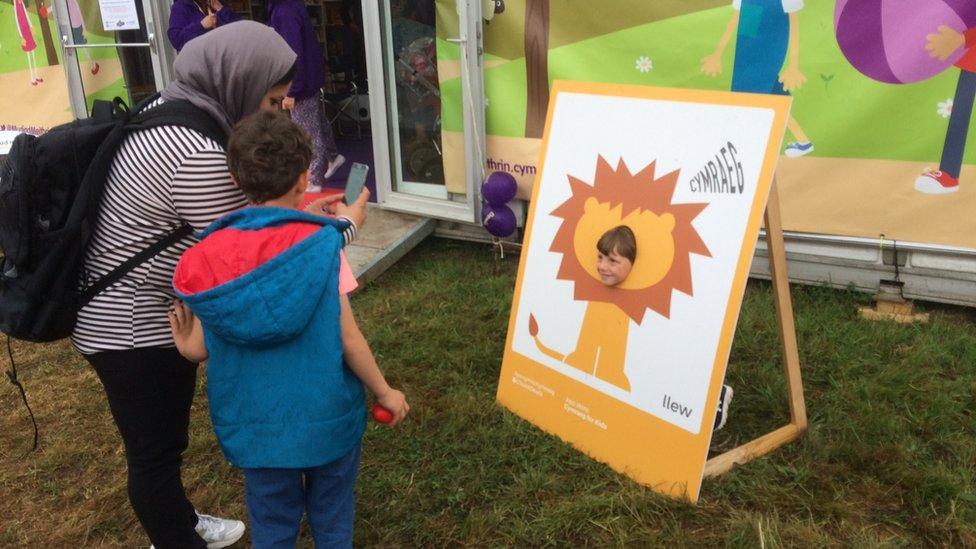Do immigrants to Wales have enough opportunity to learn Welsh?
- Published
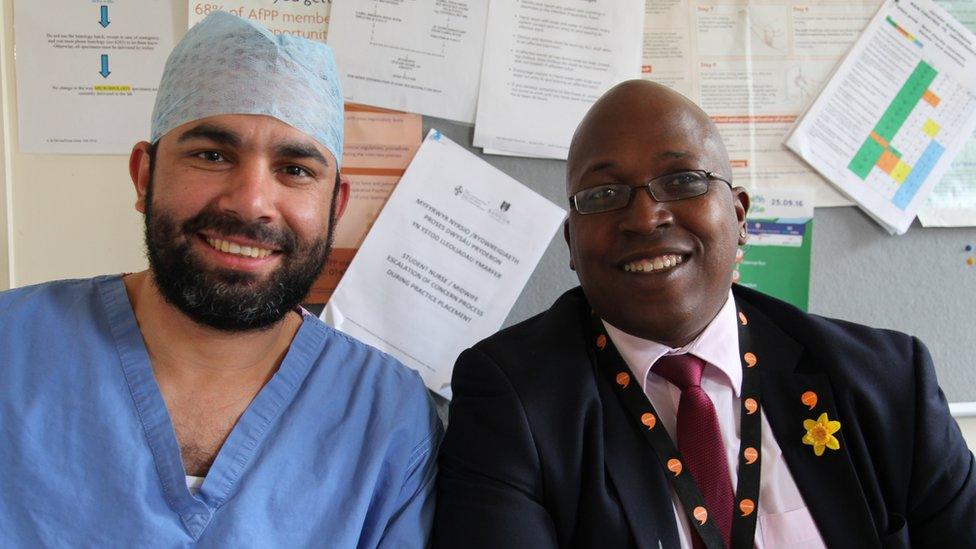
Egyptian doctor Dr Mahmoud Elsayed and Barbadian surgeon Phillip Moore have gained huge benefits from learning Welsh
Immigrants to Wales are barely aware that Welsh exists, according to one AM. But as new arrivals across the UK face pressure to learn English, is there the same interest - and opportunity - for migrants to Wales to learn Welsh?
Dr Mahmoud Elsayed beams with pride as he shows off a video of his seven-year-old daughter singing a song in Welsh.
"My children are learning Welsh better than me," he smiles. "And this is what prompted me to learn. Now I can read stories with them."
The Bangor-based Egyptian doctor is one of a group of Ysbyty Gwynedd staff from countries including Germany, Hungary, Cuba, and Ghana who are learning Welsh.
Lessons are covered by Betsi Cadwaladr University Health Board (BCUHB). All seven of Wales' health boards help staff learn Welsh, with most offering to pay for tuition.
BCUHB say the aim is to "to create a bilingual, fit-for-purpose workforce" in a majority-Welsh speaking area increasingly reliant on non-Welsh speakers to fill NHS posts.
It seems to be working. Dr Elsayed says learning the language has been of great benefit, both personally and professionally.
"If I speak Welsh with patients, they are extremely happy, friendly, and co-operative.
"If you are very weak, your brain doesn't have any power. You can only speak your first language. You don't have the power to translate."
Although Bangor is fairly diverse, in the 2011 census, just 3.5% of Gwynedd's population were non-white, compared to 14% across England and Wales.
Does this matter to ethnic minority Welsh learners like Dr Elsayed?
"When I speak to people in Welsh, people actually look shocked," he laughs. "But Welsh people really embrace it. They are extremely happy and supportive. And it is not a difficult language."
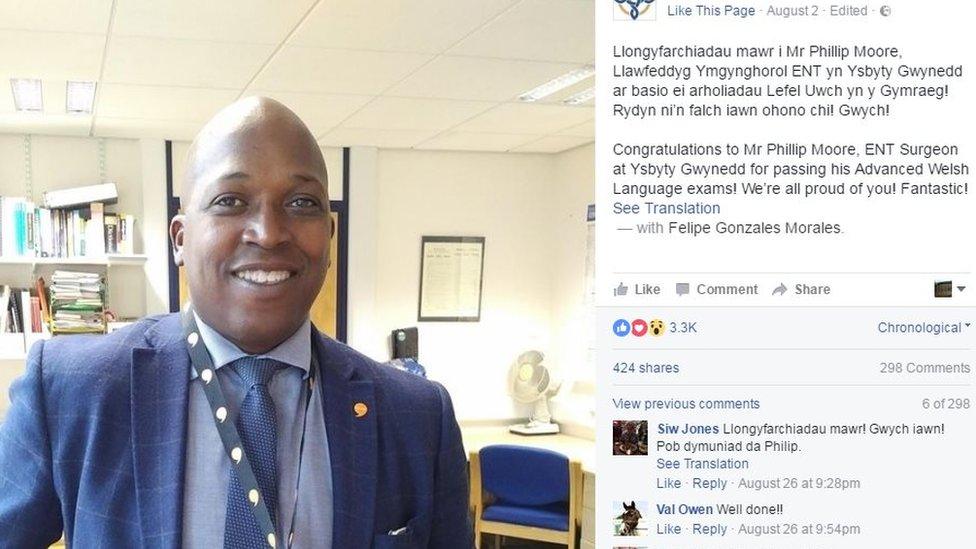
Mr Moore has received huge acclaim on social media for passing his Advanced Welsh language exams
Surgeon Phillip Moore, from Barbados, agrees that community encouragement has kept him going.
Despite claiming not to be good at languages, he has recently passed his Advanced Welsh Language exams, to great acclaim.
A group of nurses joke with him that he can now eavesdrop on their conversations. "I can't lie," he grins. "I can understand everything."
For Mr Moore, like his colleague Dr Elsayed, learning Welsh has been a fulfilling experience.
"The culture of Wales is intimately bound up in the language," he explains. "Learning the language helps you integrate better.
"People actually appreciate it more that someone who has come from so far away has made the effort to learn the language.
"Whereas you have people who come just across the border from Liverpool and Manchester who have lived in north Wales for 20 years and haven't made the effort.
"Part of settling into any country is having an understanding of the local language."
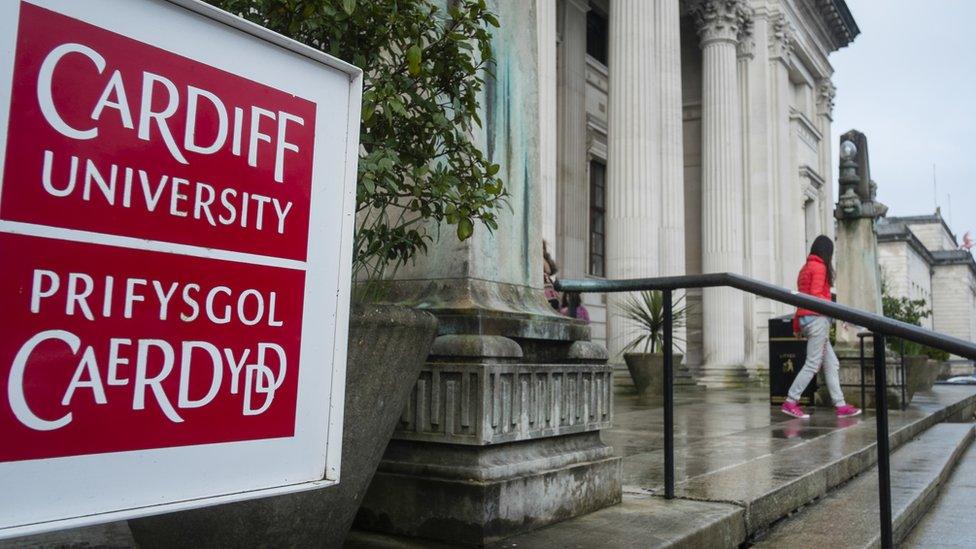
Cardiff University run open days for Welsh learners from ethnic minority backgrounds
The National Centre for Learning Welsh, established on August 1, believes anyone, "whatever their background and wherever they live", should have the same opportunities to learn Welsh.
'Welsh for the family' and 'Welsh in the workplace' are priorities, as well as online learning.
They offer free Welsh taster sessions nationally.
Courses are available during the day, evening and online, and there are discounts for full-time students and those who receive benefits. A financial contingency fund also helps learners who do not have the money to pay for lessons.
In addition, the Welsh Government funds 23 Mentrau Iaith (language initiatives) - community organisations that promote the use of Welsh throughout Wales.
'Respect'
But as you travel from north to south Wales, Welsh as a thriving community language starts to disappear.
And for many new arrivals, so do the reasons for learning.
But Kurdish refugee Salah Rasool, who lives in Cardiff, says he still wanted to learn out of "respect" for a fellow minority culture.
Mr Rasool, who arrived in Wales after fleeing Iraq, now works for the Welsh Refugee Council - and even took his wedding vows in Welsh.
"To become a part of this small country, I felt it was important for me to make some effort to integrate," he says.
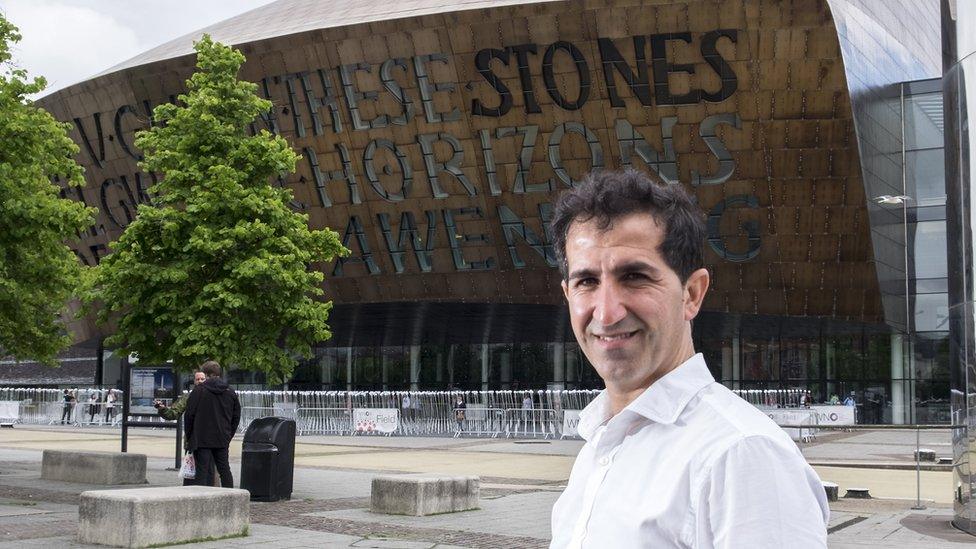
Kurdish refugee Salah Rasool - who speaks six languages - took his wedding vows in Welsh
Swansea University lecturer Gwennan Higham has just finished a PhD looking at Welsh learning amongst immigrants.
Like Mr Rasool, she says many migrants have a great respect for Welsh.
She admits there are challenges in areas like Cardiff, but says learning the language "opens doors" and is "an asset if people want to pursue careers in Wales".
And, she adds, those who already speak several languages - especially Arabic, which shares similar accents and sounds - often find Welsh easier.
"There is an element of not caring about mistakes - they just give it a go.
"They actually think it is far more easy to learn than English. There is such potential there."
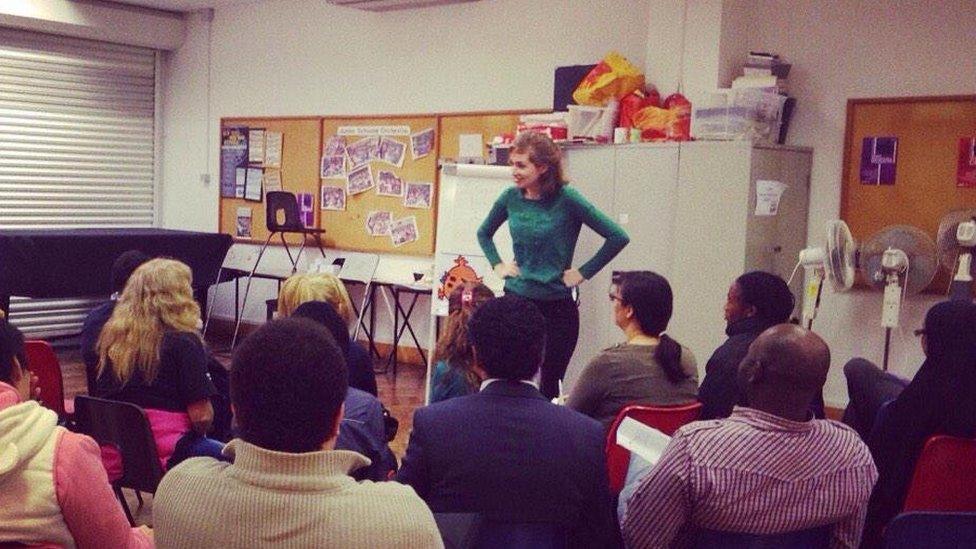
Lecturer Gwennan Higham says new arrivals face "barriers" to learning Welsh
Yet for many, this potential has yet to be fulfilled.
Lithuanian translator Remigijus Siauciunas moved to Cardiff from London in search of a different cultural experience.
But, he says, he was very disappointed by the lack of Welsh learning opportunities in the capital.
"It was quite difficult. People look at it very negatively. I thought it was weird - you could learn English for free in many places. But not Welsh. It's not fair, and it goes against all equality principles."
He thinks it is important for immigrants to learn Welsh in order to integrate.
"They will then understand the history and culture of the place they live. Countries who take a proactive attitude towards integration have better results."
Mr Siauciunas was moved to submit a petition to the National Assembly's petitions committee, where it was debated earlier this month.
It has now been referred to the Culture and Welsh Language and Communications committee for discussion with the Welsh Language Commissioner.
Although the committee agreed that free Welsh lessons are available, committee member and Plaid Cymru AM Neil McEvoy said many new arrivals are still not taught a single word of Welsh.
"As a newcomer to Wales, the cultural identity of the country is almost ignored," he added.
"It's a big issue. People come from Poland and Romania and they aren't aware of the fact that the language exists, sometimes."
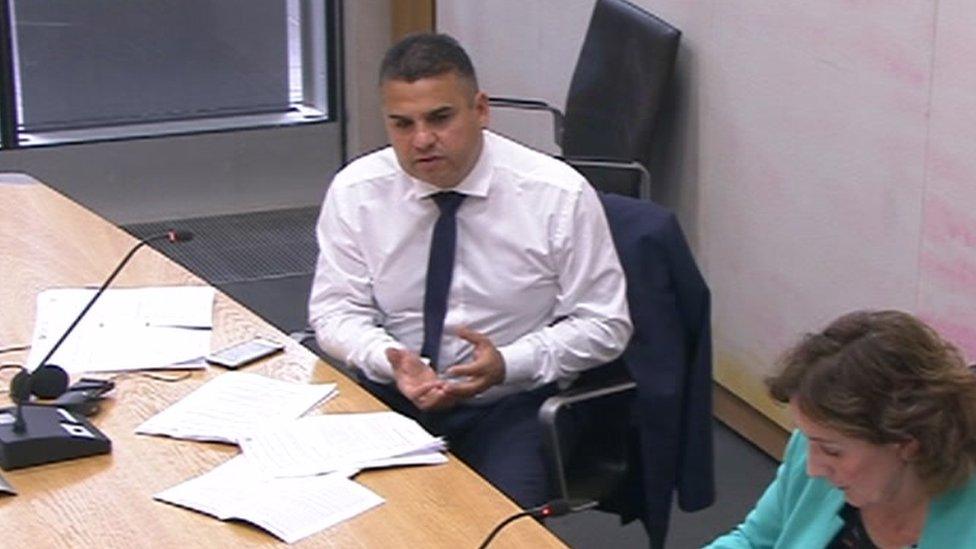
Plaid Cymru AM Neil McEvoy said "some migrants aren't aware Welsh even exists"
Cardiff University has supported refugees and immigrants with scholarships to learn Welsh, and holds open days on St David's Day for learners from ethnic minority backgrounds.
Last year, they ran a five-week 'Introduction to Wales' course at the Oasis asylum seekers and refugees centre, with many of the 11 attendees going on to pursue Welsh courses.
However, neither the centre nor the university hold any statistics for how many immigrants to Wales actually take up lessons.
Mr Rasool agrees more could be done.
He says the Welsh Refugee Council only run English classes, and that a "very, very small number" of refugees learn Welsh.
"People want to learn though," he adds. "Language is important - so the more you speak, the better. And many refugees speak at least two languages already."
Dr Higham thinks equal provision should be given to providing English and Welsh lessons to refugees and migrants, and that teaching the two languages could even be blended.
"I think the Welsh Government have an attitude of benign neglect," she says. Support for the language fell this year by 5.9% to £25.6m in the Welsh budget.
"I think partly they want to be able to get those who do speak Welsh to use it, rather than create new learners.
"The government don't seem to want to invest in what is actually needed if they want to really revitalise the language."
She adds that much Welsh language provision can seem "middle-class."
"I want to be able to see Welsh provision placed within the community, where everyone feels welcome."
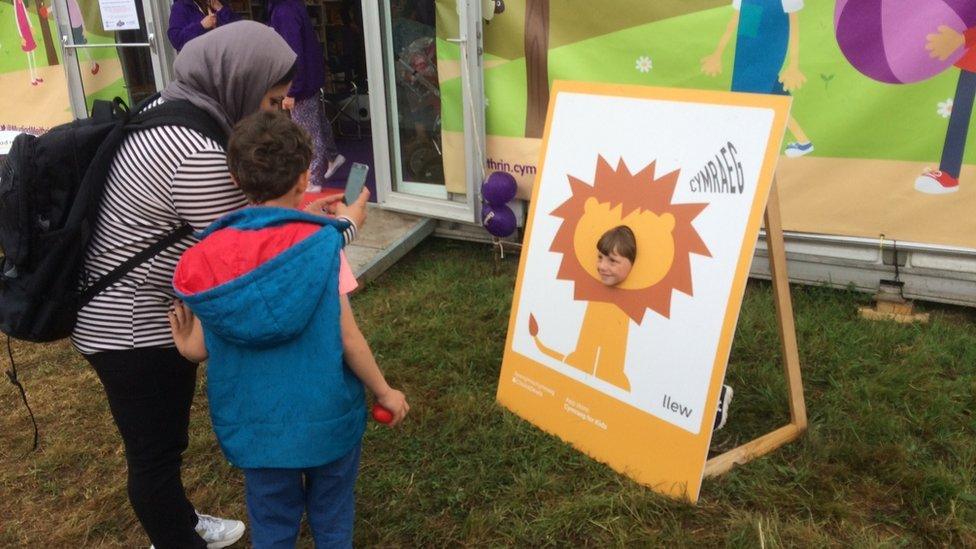
The Alrariees family, refugees from Syria, visited this year's Eisteddfod to give them a taste of Welsh culture
The Welsh Government says it remains committed to securing the future of the language.
Their initial focus is to ensure refugees improve their English, "to access employment and training to contribute and adapt to living in a new country."
But, a spokesperson adds: "The role of Welsh learning and culture is fundamental for new arrivals to understand the importance which the language plays to communities across Wales.
"Local authorities decide how to allocate funding for language provision based on need and considering how to aid successful integration."
'Rewards'
As Dr Elsayed explains, some migrants view Welsh as a "limited language", not worth learning.
It is a viewpoint he disagrees with.
"Most of the people who say this have been living here for 12 years, and they still have that point of view. Even if you are living here for 11 months, it is your country."
And although he is soon to move to a new job in England, he says learning Welsh has "opened doors".
"I have used it with the children. I have lots of letters from patients, I have good relations with lots of people in the community. Even if you stay for just one year, it's very, very beneficial.
"You have to sacrifice your time. But you get your rewards.
"And if it was not for my career, I would never leave here."
- Published9 December 2015

- Published1 August 2016
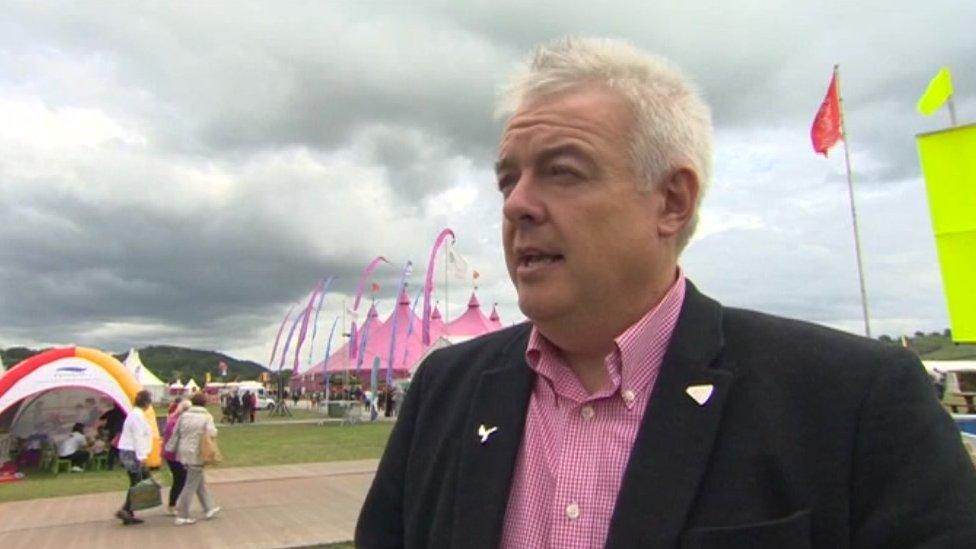
- Published12 August 2016
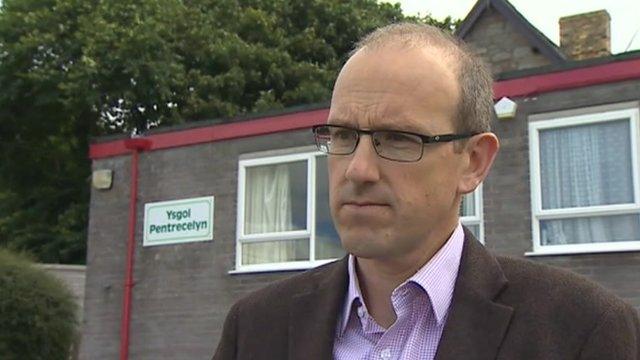
- Published28 July 2016
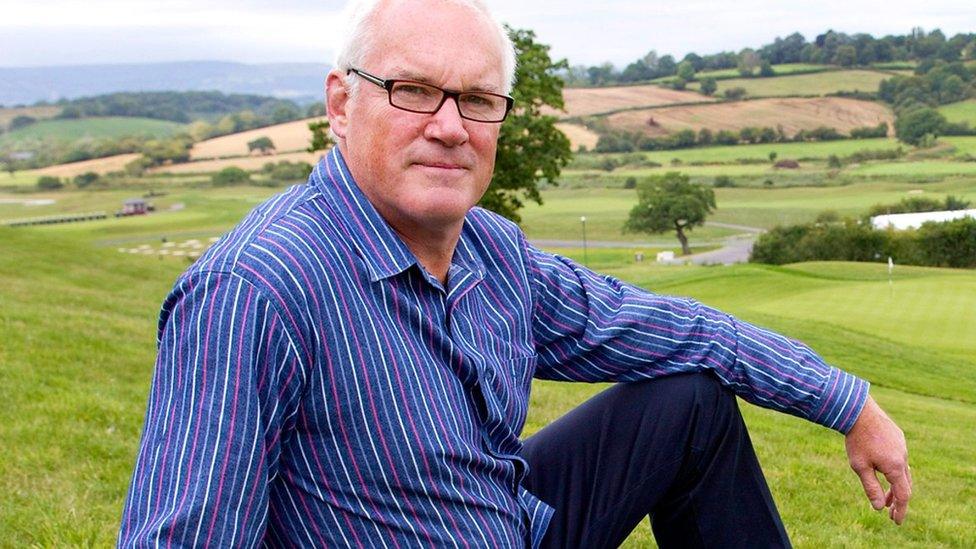
- Published24 May 2016
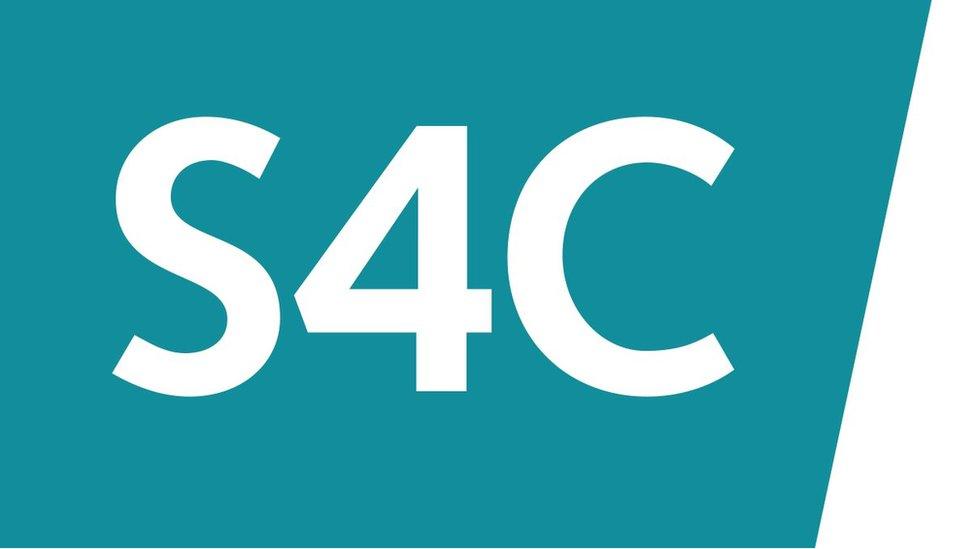
- Published1 August 2016
